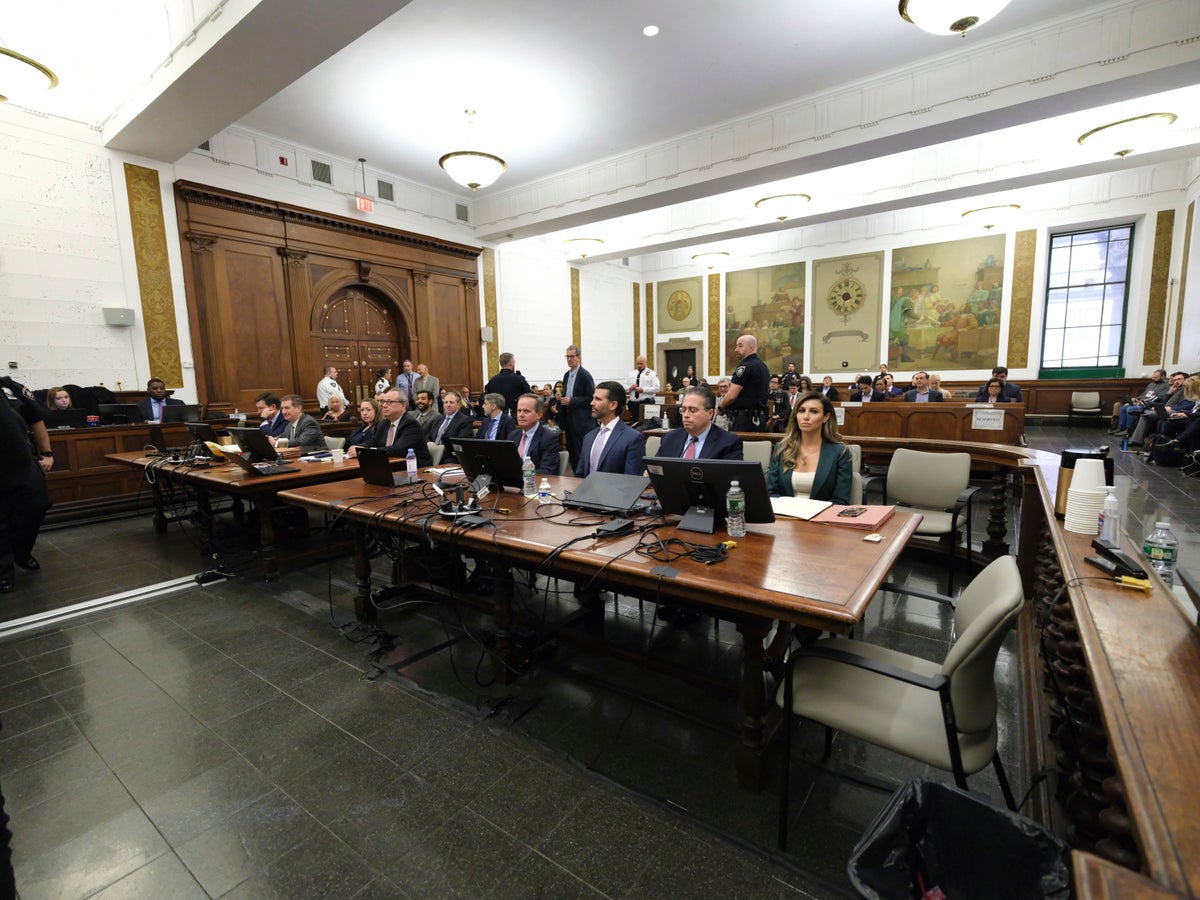
Donald Trump blamed his accountants. So did the two sons he entrusted to run his company. Now, as they mount their defense in the civil fraud trial threatening the former president’s real estate empire, his lawyers are too.
Trump’s lawyers spent Tuesday digging into outside accounting firm Mazars USA LLP’s role in preparing financial statements at the heart of New York Attorney General Letitia James’ lawsuit, upping the blame with expert testimony from a former federal financial regulator.
Jason Flemmons, testifying as an accounting expert, questioned some of the firm’s practices and raised doubts about earlier testimony from Donald Bender, the retired Mazars partner who spent years working on Trump’s financial statements.
Bender, the first witness called by state lawyers, testified Oct. 3 that he'd asked a Trump Organization executive for all of the company’s property appraisals — not just ones used for the financial statements — and that he was surprised when he learned years later that some hadn't been turned over.
Flemmons, a former deputy chief accountant at the U.S. Securities and Exchange Commission, said Bender’s claim was “not professionally plausible” because such diligence isn’t required under professional accounting standards.
Compiling financial statements involves a “much lighter touch” than more stringent accounting practices, like audits, and requesting appraisals “would be highly unusual" and “entirely inconsistent" with what’s required, Flemmons testified.
In preparing financial statements, also known as compilations, accountants need only documentation used to determine the value of assets, like Trump’s skyscrapers, golf courses and other properties.
In Trump’s case, Flemmons said, his company determined the numbers and met the requirements by providing justification for them and explaining instances where it used different standards to determine a value, which is permitted. Flemmons, who will return to the stand Wednesday, has not been asked to address the state’s specific claims that Trump executives used a variety of methods — sometimes misclassifying properties — to attain the highest values.
“There would be no obligation or expectation on the part of Mazars or any accountant performing compilation services” to request appraisals that weren’t used to arrive at the values," said Flemmons, now a senior managing director at Ankura, a Washington, D.C., consulting firm.
A message seeking comment was left for Mazars. The firm cut ties with Trump last year and said his financial statements “should no longer be relied upon” after James raised concerns about their accuracy.
Flemmons testified on the second day of the defense’s case as Trump’s lawyers seek to refute the state’s claims that the 2024 Republican front-runner, his company and top executives manipulated the value of his assets to make him look wealthier and his properties more successful than the actually were.
James, a Democrat, alleges Trump, his company and top executives exaggerated his wealth by billions of dollars on the financial statements by inflating property values. The documents were given to banks, insurers and others to secure loans and make deals. James is seeking more than $300 million in what she says were ill-gotten gains, and she wants the defendants banned from doing business in New York.
Before the trial, Judge Arthur Engoron ruled that Trump and other defendants committed fraud by exaggerating his net worth and the value of assets on his financial statements. The judge imposed a punishment that could strip Trump of some marquee properties, though an appeals court is keeping them in his control for now.
Trump has denied wrongdoing. On the stand Tuesday, Flemmons echoed Trump’s longstanding assertion that disclaimers on the financial statements insulated him from liability for discrepancies or misstatements.
“It’s effectively saying user beware,” Flemmons testified.
Trump has argued that, if anything, his financial statements undervalued how much his properties were worth. On the stand last week, he reiterated his belief that his Mar-a-Lago estate in Florida is worth up to $1.5 billion, more than double the highest value listed for it on his financial statements.
Trump’s lawyers ran with that claim Tuesday, arguing it didn't matter if he overvalued some of his properties because he significantly undervalued others.
They raised the argument while questioning another expert, real estate developer and Trump friend Steven Witkoff, who claimed that Trump’s Doral, Florida, golf resort had been severely undervalued on his financial statements.
“Is it your position that if one property is overvalued by $300 million and another property is undervalued by $300 million it balances out and there’s no misstatement or fraud?” Engoron asked, criticizing the argument as “ridiculous” and shutting it down.
Witkoff, who’s hosting a fundraiser for Trump in Florida next month, testified that developers value their properties based on their potential — like building condominiums on a golf course or turning an office tower into apartments — rather than their current state.
Donald Trump Jr., a Trump Organization executive vice president, testified Nov. 1 that he signed off on statements as a trustee of his father’s trust, but had left the work to outside accountants and the company’s then-finance chief, Allen Weisselberg.
“As a trustee, I have an obligation to listen to those who are expert — who have an expertise of these things,” Trump Jr. said.
His brother, Eric, echoed that sentiment, testifying Nov. 3 that he relied on “one of the biggest accounting firms in the country” for assurance that the financial statements were accurate.
Donald Trump, testifying Nov. 6, said he paid Mazars millions of dollars for its services and said he gave McConney and Weisselberg “total authority” to work with the firm and give it whatever it needed to come up with his financial statements.
“If the accounting firm was unhappy, they would go back and they would say, we need this, we need that,” Trump testified. They were very insistent on that. Very insistent on that. But they came up with statements in each of those years, so obviously they were satisfied."
__
Follow Michael Sisak at x.com/mikesisak and send confidential tips by visiting https://www.ap.org/tips







